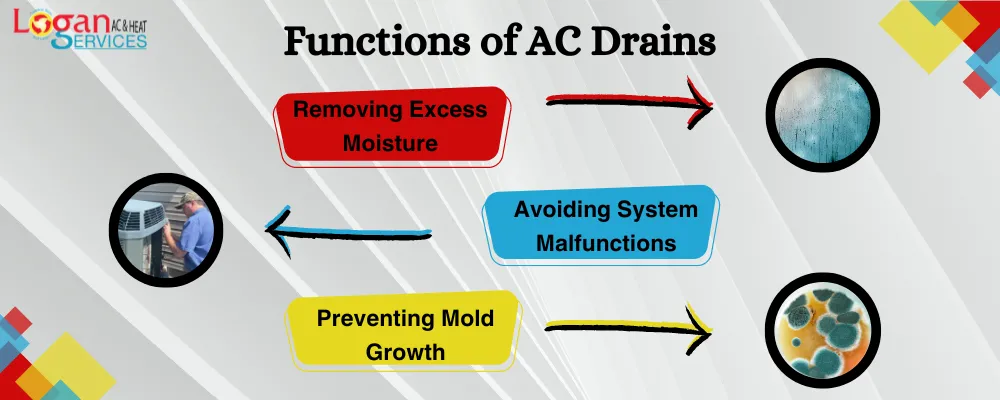AC units are essential in homes, offices, and cars, especially during hot weather. They require proper maintenance to perform optimally and prevent damage. The air conditioner drain line in a home is a critical component that needs regular care. This article will explore the basics of AC drain and its functions, maintenance tips, and how to troubleshoot common problems. Additionally, we recommend contacting HVAC professionals to answer frequently asked questions about AC drains.
Understanding the Basics of AC Drain
The air conditioner drain line is a critical HVAC system component. It is designed to carry excess condensation created by the AC unit’s evaporator coil away from the system, preventing water damage and maintaining optimal performance. By understanding the basics of AC drains, you can better maintain your system and ensure its longevity.
Functions of AC Drains

AC drains serve multiple purposes that contribute to the efficiency and durability of your air conditioning system:
- Removing excess moisture: The drain system collects and removes condensation from your AC unit, preventing water damage to your equipment and property.
- Improving air quality: Drains help maintain a dry environment that removes excess moisture, impacting indoor air quality.
- Avoiding system malfunctions: Drains promote the smooth operation of your system by preventing excess water from reaching critical components such as electrical wiring and motors.
AC Drain Maintenance
Proper drain system maintenance is crucial to prevent blockages, overflow, and costly repairs. Regular cleaning should be part of your routine HVAC maintenance to avoid potential issues during the year’s hottest months.
Importance of Annual Maintenance

Keeping your AC drain clean is an essential aspect of HVAC maintenance. Regular cleaning can provide numerous benefits:
- Prevents clogs: Dirt, algae, and other debris can accumulate in the air conditioner drain line, causing clogs that may lead to costly water damage.
- Improves indoor air quality: A clean drain system helps remove excess moisture, ensuring good air quality in your home.
- Enhances system performance: Routine cleaning ensures your AC unit runs efficiently, reducing the likelihood of breakdowns and extending its lifespan.
Signs of AC Drain Issues
Knowing the symptoms of drain problems can help you identify and address them before they become expensive repairs. Common signs of AC drain issues include:
- Water leaks around the indoor unit or puddles on the floor.
- Unpleasant odors are coming from the vents or around the unit.
- Musty or damp air in your home.
If you notice any of these signs, contact a professional HVAC technician to diagnose and fix the problem.
Troubleshooting Common AC Drain Problems
Some of the most common causes of drain problems include:
- Clogged drain line: Dirt, debris, or slime can accumulate in the drain pipe, leading to water backing up in the system and eventually causing a leak. To fix this, turn off your AC unit, locate the drain line and use a long, flexible brush to clean the pipe thoroughly. You can also pour a mixture of bleach and water (1 cup of bleach for 1 gallon of water) down the drain line to kill any remaining algae growth.
- Leaking drain pan: A leak usually occurs when the drain pan is damaged, rusted, or warped, causing water to spill onto the floor. To fix this, turn off your AC unit, inspect the drain pan for visible signs of damage, and seal any small leaks with epoxy or duct tape. If the pan is severely damaged, consider replacing it with a new one.
- Cracked or broken drain line: A cracked or broken drain line can lead to water leaks and possible damage to your home. To fix this, turn off your AC unit and locate the drain line. Inspect the pipe for visible signs of damage, and if you find any, contact an HVAC professional to replace the damaged pipe.
Investing in high-quality materials for your HVAC system can help prevent cracked or broken drain lines, ensuring a longer lifespan and fewer issues down the road.
Professional Assistance and Recommendations
While some common AC drain problems can be resolved through DIY solutions, it is essential to know when to consult an HVAC professional and the importance of annual maintenance to keep your air conditioning system running optimally.

When to Contact an HVAC Professional
Here are some instances where it is recommended to seek professional help when dealing with AC drain problems:
- Recurring clogged ac drain lines, indicating a more significant issue with your system.
- Signs of water damage to your home, such as warped floors, which could result from a leaking air conditioner.
- A severely damaged drain pan or drain line that may require expertise and specialized tools to remove and replace correctly.
- When you are unsure about your system’s components or how to troubleshoot specific problems, an HVAC professional can provide expert guidance and ensure the issue is resolved effectively.
Ultimately, enlisting the help of a professional HVAC technician can save you time, money, and prevent additional damage to your system and property.
About Logan Services A/C, Heat & Plumbing
Logan is a family-owned and operated HVAC company that has been serving the Columbus, Cincinnati, and Dayton areas for over 50 years. We offer a wide range of services, including AC drain line cleaning and repair. Our team of experienced technicians is highly skilled in diagnosing and repairing AC drain line problems. We also offer a variety of preventive maintenance services that can help you keep your AC unit running smoothly and prevent costly repairs.
If you are experiencing AC drain line problems, Logan can help. Contact us today to schedule an appointment.
FAQs AC Drain
Why is AC Drain Maintenance Important?
Proper maintenance of your AC drain line is crucial to ensure the efficient functioning of your air conditioning system. A clogged drain line can lead to water damage and reduced energy efficiency. By regularly inspecting and cleaning your AC drain, you can prevent costly repairs, improve indoor air quality, and keep your system running smoothly.
What Causes AC Drain Line Clogs?
Several factors can contribute to the clogging of an AC drain line. The most common causes include the accumulation of dirt, debris, and algae in the line. Over time, these substances can build up and block the flow of water, leading to an overflowing drain pan and potential water damage. Additionally, pests such as insects or rodents can sometimes enter the line and create obstructions.





















